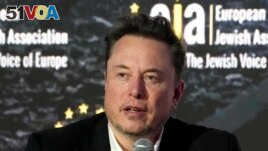04 March 2024
Business leader Elon Musk is bringing a legal case against artificial intelligence (AI) company OpenAI and its chief Sam Altman.
Musk is chief of carmaker Tesla and SpaceX and also leads the social media service X. He said OpenAI is betraying its founder's aims by seeking to increase profits rather than helping the world.
Musk brought the legal action in San Francisco Superior Court. He said that, at first, he financially supported OpenAI, the maker of the AI tool ChatGPT. He said he had an agreement with Altman and Greg Brockman, the president. That agreement was to keep the artificial intelligence company as a nonprofit organization. Musk said the goal was to develop technology that would help the public.

FILE - Elon Musk addresses the European Jewish Association's conference, in Krakow, Poland, Monday, Jan. 22, 2024. Musk is suing OpenAI and its CEO Sam Altman over what he says is a betrayal of the ChatGPT maker's founding aims. (AP Photo/Czarek Sokolowski, File)
Under its founding agreement, OpenAI would also make its code open to the public instead of making it the company's private property, the lawsuit says. Musk claims in the lawsuit that OpenAI went against the agreement by having a close relationship with Microsoft.
OpenAI did not comment on the lawsuit last week.
Musk's lawsuit says OpenAI broke a contract, failed in its financial responsibility, and used unfair business methods. Musk also wants to prevent anyone, including Microsoft, from profiting from OpenAI's technology.
Musk was early supporter of OpenAI
Anupam Chander is a law professor at Georgetown University in Washington, D.C. He said Musk's claims are unlikely to succeed in court. However, he said that might not be the point for Musk, who is getting his personal story on the record.
Chander said Musk claims he named OpenAI, employed an important scientist, and that he was the main financial supporter in its early years. He said, "In some sense, it's a lawsuit that tries to establish his own place in the history of generative AI."
Musk was an early investor in OpenAI when it was founded in 2015. He was a leader in the company alongside Altman. In the lawsuit, he said he invested "tens of millions" of dollars in the nonprofit research laboratory.
Musk left the company in early 2018 in a move that OpenAI said at the time would prevent conflicts of interest. Musk's Tesla car company was looking for people in AI to help develop self-driving car technology.
Musk has since said he disagreed with the company's direction but continued to give money to the nonprofit.
Later, OpenAI created a for-profit arm and began moving most of its workforce to that business. But it kept its nonprofit board of directors that oversaw the company.
Microsoft investment
Microsoft made its first $1 billion investment in the company in 2019. The next year Microsoft signed an agreement with OpenAI giving Microsoft the rights to OpenAI's AI models. That agreement is supposed to end once OpenAI has created artificial general intelligence (AGI), the company has said.
AGI is a sort of artificial intelligence that can perform just as well or even better than humans in different kinds of work.
The nonprofit board of directors fired Altman as chief executive officer late last year. But Microsoft helped bring Altman back and pushed most of the old board of directors to leave.
Musk's lawsuit claims that those changes caused the balance of power protecting the nonprofit aim of the company to "collapse overnight." One of Musk's claims is that the directors of the nonprofit have failed in their duty to support its nonprofit aim.
Dana Brakman Reiser is a professor at Brooklyn Law School. She questions whether Musk has standing, or a connection to the case, that a court would uphold.
She said it would be a problem if every person who cared about or gave money to a nonprofit group could bring a lawsuit against its leaders and officers. She said only other directors, or a government legal official could bring that sort of lawsuit.
Musk now has his own AI company. But his legal case against Altman could inform the public about private talks and decision-making that took place at OpenAI. The company's lawyers will likely fight to keep some of those documents from being released.
Investor Chamath Palihapitiya wrote on X, Musk's social media service: "The discovery will be epic." Discovery is the process by which lawyers request documents related to a legal case. Musk answered in his only public comments on the case so far: "Yes."
I'm Caty Weaver. And I'm Bryan Lynn.
Kelvin Chan, Thalia Beaty, and Matt O'Brien reported this story for The Associated Press. Gregory Stachel adapted it for VOA Learning English.
______
Words in This Story
betray – v. to ignore your principles or beliefs in order to achieve something or gain an advantage for yourself
lawsuit – n. a claim or complaint against somebody that a person or an organization can make in court
code – n. a system of computer programming instructions
generate – v. to produce or create something
epic – adj. very great or large and usually difficult or impressive










